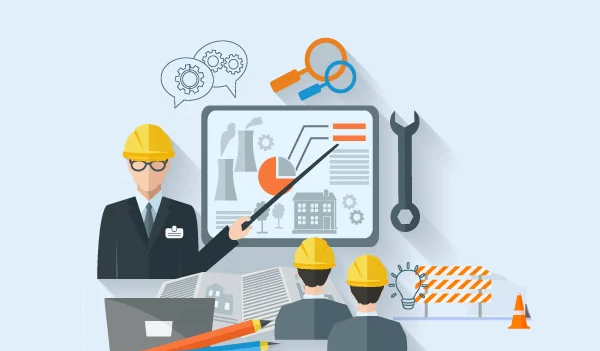In the dynamic world of construction, where precision and efficiency are paramount, a new player has emerged to revolutionize project management – Construction ERP (Enterprise Resource Planning). In this blog post, let’s embark on an insightful journey into the world of Construction ERP, exploring its definition, features, and how it’s becoming the backbone of modern construction projects.
What is Construction ERP?

Building Success Brick by Digital Brick
Construction Enterprise Resource Planning is not just a software; it’s a comprehensive solution designed specifically for the unique needs of the construction industry. It integrates various aspects of project management, resource allocation, financial tracking, and communication into a unified digital platform. The goal is clear – to enhance efficiency, reduce errors, and empower construction teams to deliver projects on time and within budget.
Navigating the Features of Construction ERP
1. Project Management Mastery
Construction ERP brings project management to a whole new level. From initial planning to execution and delivery, the platform offers tools to streamline every phase. Project managers can allocate resources effectively, monitor progress in real-time, and ensure that every element of the project is on track.
2. Resource Allocation and Tracking
Efficient resource management is a hallmark of successful construction projects. Construction ERP provides a centralized system for tracking and allocating resources, whether it’s labor, materials, or equipment. This not only prevents overallocation but also ensures that resources are optimally utilized.
3. Financial Control and Transparency
Cost overruns are a common challenge in construction. Construction Enterprise Resource Planning helps in keeping a tight grip on finances. It provides real-time financial insights, tracks expenses, and facilitates accurate budgeting. This transparency ensures that financial goals align with the progress of the project.
4. Collaboration and Communication Hub
Construction projects involve numerous stakeholders – from architects to contractors to clients. Construction ERP acts as a central hub for collaboration and communication. Teams can share updates, documents, and communicate seamlessly, fostering a culture of transparency and teamwork.
Why Construction Businesses Need ERP

1. Precision in Planning
Construction projects demand meticulous planning. Construction Enterprise Resource Planning brings precision to the planning phase, allowing teams to create realistic timelines, allocate resources effectively, and identify potential challenges before they escalate.
2. Cost Efficiency and Control
One of the biggest challenges in construction is managing costs. Construction Enterprise Resource Planning ensures cost efficiency by providing real-time financial data, enabling proactive decision-making to avoid budget overruns.
3. Enhanced Project Visibility
Construction ERP provides a bird’s eye view of the project. Project managers can monitor progress, identify bottlenecks, and make data-driven decisions to keep the project on schedule.
4. Improved Collaboration
Construction involves collaboration between diverse teams. Construction ERP fosters collaboration by providing a centralized platform for communication, document sharing, and updates. This reduces miscommunication and ensures everyone is on the same page.
Implementing Construction ERP: A User-Friendly Guide
1. Understanding Your Construction Needs
Before diving into the world of Construction Enterprise Resource Planning, it’s essential to understand the specific needs of your construction projects. Are you dealing with large-scale commercial projects, residential builds, or a mix of both? Understanding your unique requirements will guide your choice of Construction ERP.
2. Choosing the Right Construction ERP Solution
The market is flooded with Enterprise Resource Planning solutions, but not all are tailored for the construction industry. Choose a Construction ERP solution that aligns with the scale and complexity of your projects. Look for features like project management tools, resource tracking, and financial controls.
3. Customization for Your Construction Workflows
No two construction companies operate identically. Construction Enterprise Resource Planning systems are designed to be customizable, allowing you to tailor the system to fit seamlessly with your existing workflows. This customization ensures that the ERP system works for you, not the other way around.
4. Training Your Construction Team
Implementing Construction ERP requires training your construction team. Choose a system with a user-friendly interface and invest in training programs to ensure that your team is comfortable and proficient in using the platform. User adoption is key to reaping the full benefits of Construction Enterprise Resource Planning.
Challenges and Solutions in the Construction ERP Landscape
1. Resistance to Technology Adoption
In an industry that has traditionally relied on manual processes, there might be resistance to adopting new technologies. A thorough communication plan, showcasing the benefits of Construction Enterprise Resource Planning, and providing comprehensive training can address this challenge.
2. Integration with Existing Systems
For construction companies with existing systems, integrating Construction Enterprise Resource Planning can be complex. However, many ERP solutions offer tools and support for seamless integration, minimizing disruptions to existing workflows.
3. Data Security Concerns
Construction projects involve sensitive data, and data security is a valid concern. Choosing a Construction ERP system with robust security features, encryption, and compliance certifications is crucial to safeguarding sensitive information.
Realizing the Benefits: Success Stories of Construction ERP Adoption
Company Q: Completing Complex Projects with Precision
Company Q, a construction firm specializing in high-rise buildings, implemented Construction ERP to manage the complexity of its projects. The platform streamlined project management, facilitated efficient resource allocation, and provided real-time financial insights. As a result, Company Q completed projects with greater precision and within the set timelines.
Company R: Enhancing Collaboration Across Teams
For Company R, a residential construction company with multiple teams across locations, Construction Enterprise Resource Planning became the glue that held everything together. The platform’s collaboration tools improved communication, reduced errors, and enhanced overall efficiency, leading to increased client satisfaction.
The Future of Construction ERP: Trends and Innovations
1. IoT Integration for Smart Construction
The Internet of Things (IoT) is making its way into the construction industry. Construction Enterprise Resource Planning systems of the future might integrate IoT devices for real-time monitoring of equipment, materials, and even worker safety.
2. Predictive Analytics for Risk Management
The integration of predictive analytics into Construction ERP systems can revolutionize risk management. By analyzing historical data, these systems can predict potential risks, allowing construction companies to proactively address challenges.
3. Mobile Construction ERP Applications
As construction teams become more mobile, the future of Construction Enterprise Resource Planning involves enhanced mobile applications. These applications will empower construction managers and teams to access critical information, make decisions on the go, and keep projects on track from anywhere.
Conclusion: Building Tomorrow with Construction ERP
In the ever-evolving world of construction, where each project is a unique puzzle of challenges and opportunities, Construction Enterprise Resource Planning emerges as the key to unlocking efficiency and success. It’s not just about managing projects; it’s about transforming the way construction businesses operate.
Whether you’re a small residential builder or a large-scale commercial construction firm, consider Construction Enterprise Resource Planning as your strategic partner. Streamline your projects, enhance collaboration, and embrace the future with the digital magic of Construction ERP. It’s time to build tomorrow, one efficient project at a time!
Read Also:
- Acumatica ERP
- Online ERP
- ERP Program
- The Leading 25 Big Data Terms You Ought To Understand
- Ecommerce Business Intelligence: Benefits, Use Cases and Tools